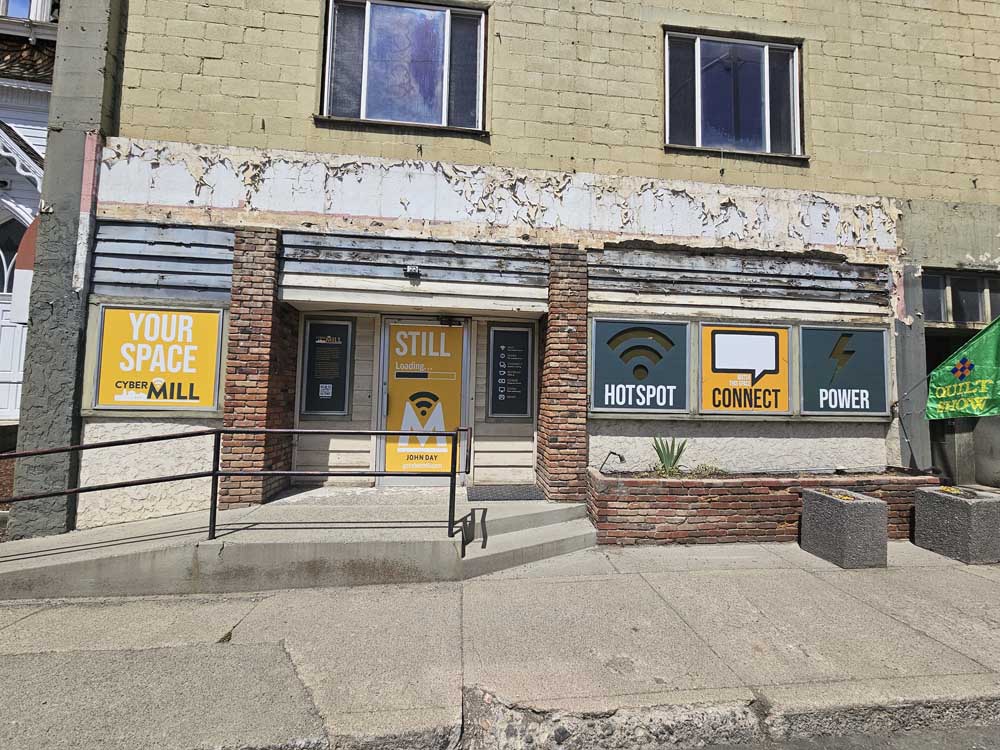Seneca, John Day CyberMill buildings could be up for sale
Published 1:00 pm Wednesday, June 12, 2024

- The city-owned building at 241 W. Main St. in John Day, shown here on May 31, 2024, is still awaiting renovation three years after it was purchased with the intent of turning it into a CyberMill.
JOHN DAY — The cash-strapped city of John Day has included plans to sell the Seneca and John Day CyberMill buildings in its 2024-25 budget, throwing the future of both locations into question.
The Seneca and John Day CyberMills, along with a third location in Prairie City, were envisioned as high-speed online access points for Grant County residents who have less than adequate internet service. The Seneca CyberMill has been up and running since November 2021, but the John Day location has been on hold for years. (The Prairie City location is leased from a private owner and is unaffected by John Day’s plans.)
John Day City Manager Melissa Bethel said the sale of the Seneca CyberMill building, which was purchased by John Day as part of the city’s contribution to the Grant County Digital Network Coalition, is almost a certainty.
What happens after that is not clear. The buyer might be willing to lease the space to Grant County CyberMill, the public benefit nonprofit that runs the community internet cafes, or might have other plans for the building.
The John Day CyberMill’s sale is reflected in next fiscal year’s budget, but the sale of that city-owned property is much less certain.
The John Day CyberMill, located at 241 W. Main St., is very much an unfinished project. The building was purchased by the city in June 2021 for $90,000 as part of a partnership with Grant County CyberMill.
Initially the city planned to use a portion of a $2 million grant from the U.S. Economic Development Administration to renovate the building, which needs significant repairs before Grant County CyberMill can step in to furnish and equip the space as an internet cafe.
But the city has yet to release the funds for that purpose, and now it’s facing a budget shortfall, making a potential sale of the property attractive.
McCracken said she sees three ways that the John Day CyberMill project could move forward. The city could decide to release the grant funds so renovations can proceed, it could sell the property to another owner who would be willing to renovate the space and lease it to the nonprofit for use as a CyberMill, or it could donate the property to the nonprofit as is, leaving Grant County CyberMill to come up with the cash for renovations.
Another possibility, of course, is that the property could be sold to a buyer who has no interest in working with Grant County CyberMill. If that happens, McCracken said, the nonprofit could lose the grant funding it obtained to furnish and equip the John Day location.
“That’s obviously not a good thing to do, but on top of that, anytime you get in a situation where you have to give money back — I mean, that looks bad on that partnership and also looks bad to other entities,” she said.
For McCracken, the demise of the John Day CyberMill project would rob citizens of a valuable asset like those that are already being utilized heavily in the communities where other CyberMills are up and running.
“Our data and our demographics show kids to 80-year-olds are using it,” she said. “It’s for everybody.”
McCracken said she understands priorities are not the same for the city as they were three years ago when it bought the building, and she’s fine with that. She just hopes to see the renovation and opening of the John Day CyberMill through to completion.
“Things are different than they were,” she said. “I don’t care if people think it’s better or worse, I couldn’t care less, but priorities have changed. … Ours haven’t.”
McCracken said her hope is to have a functioning CyberMill in every town in Grant County.






